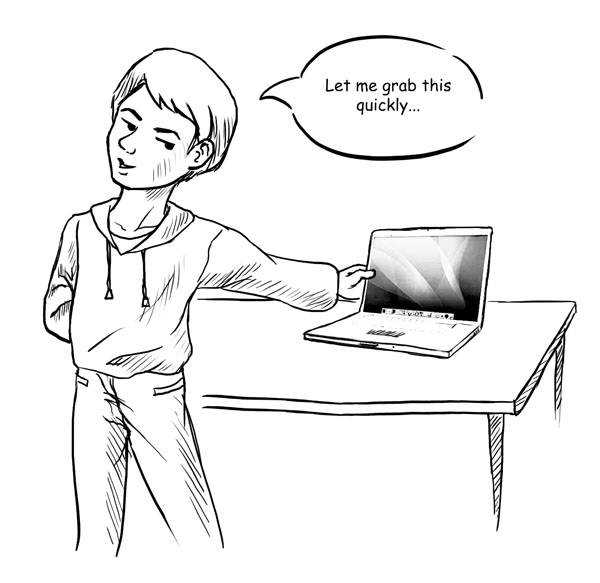I recently had my laptop stolen. It was a beautiful MacBook Pro with a 15-inch, anti-reflective screen, a 2.3gHz Intel i7 quad-core processor and a hard drive with storage space than anybody could ever need. It was my baby.
Its theft was a tragedy – for me, at least. I didn’t know what to do with myself. I wasn’t so much troubled by the loss owf such an incredible computer – which is a shame but computers are, ultimately, replaceable – but by my subsequent inability to do, well, anything.
My entire life was on that computer: gigabytes upon gigabytes of music, my most valuable school documents and, above all else, an Internet browser that I could access at my leisure.
When I reported my laptop as stolen and was asked its value by the investigating officer, it struck me that the value of a laptop extends far beyond the actual price of the machine itself.
It was only in the absence of a computer that I realized just how frequently I used mine.
I’m certainly not the only person for whom this is the case. We college students are obsessed with our computers.
We use them for everything imaginable, from socialization to schoolwork and everything in between. This is neither a good thing nor a bad thing; it’s just a product of our collective environment.
On the most basic level, a computer is one of the most important factors in determining a college student’s academic success.
Students use them for checking in on classes, writing essays, e-mailing professors, taking notes in class – the list goes on. Take away the ready access to a computer that we so often take for granted and (what little was left of) a student’s productivity goes down the drain.
Unless you’re a freshman living in Harris, it’s incredibly inconvenient to go to the library every time you need to do homework because, let’s face it, we’re constantly doing (or at least pretending to do) work.
The ramifications of a stolen computer extend far deeper than lost productivity and entertainment. All of our social networks exist on the Internet. Without constant and convenient access to these networks, it’s just too easy to fall out of the loop.
While adult readers might not understand why this is so important, younger readers know exactly what I mean.
Socially, so much changes over the course of a single day in the life of a college student that to be disconnected for any longer than the better part of a day could be detrimental, if only to the unlucky student’s sense of connectivity with the goings-on of the university.
This sort of social disconnectedness may seem trivial but, to quote astrophysicist Neil deGrasse Tyson, “that’s what you really want in life.
You want to feel connected. You want to feel relevant. You want to feel like a participant in the goings-on of activities and events around you.”
Computers are how we as college students tap into the pulse of social life on campus. Despite what some might say, it isn’t enough to tune into social networks once or twice a day.
It is of the utmost importance, socially, that a student be tied in at all times, and this can only be achieved with easy and consistent access to a computer.
Fortunately, and thanks entirely to my loving parents, I was only without a computer for 48 hours. So while I didn’t suffer too horribly, I did learn two things over the course of my ordeal:
Firstly, Emory’s campus isn’t as safe as we sometimes think. I was in my own fraternity house (in which only 11 people live) when my computer was stolen, along with some of the fraternity’s sound equipment.
Keep a close eye on your belongings, especially the valuable ones. Secondly, it is of the utmost importance that you, by some manner or another, back up your data.
I was fortunate in that I’m obsessive about ensuring that my school documents are backed up to Dropbox, the same online file storage service that ruined Dave Petraeus’ career. The rest of my data was stored on an external hard drive.
While I lost a very expensive computer, the consequences of my ordeal could have been far worse had I not ensured the security of my data.
If you take steps to protect your belongings, you can protect yourself from the sort of social trauma that I had to suffer (albeit only briefly).
Keep your belongings safe and you can keep yourself happy.
Editorials Co-Editor Nicholas Bradley is a College sophomore from Skillman, N.J.
The Emory Wheel was founded in 1919 and is currently the only independent, student-run newspaper of Emory University. The Wheel publishes weekly on Wednesdays during the academic year, except during University holidays and scheduled publication intermissions.
The Wheel is financially and editorially independent from the University. All of its content is generated by the Wheel’s more than 100 student staff members and contributing writers, and its printing costs are covered by profits from self-generated advertising sales.





